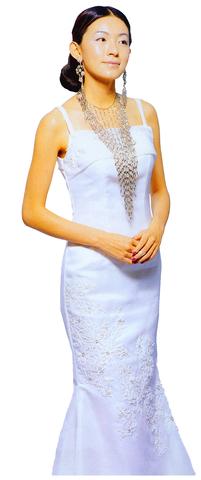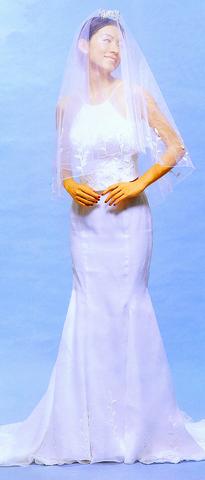Wedding dresses in Taiwan have come a long way to reflect the rising self-consciousness of today's women.
At a recent fashion show for wedding gowns, people swarmed to glimpse the latest wedding dress designs and saw something distinctly non-conventional. The dresses were chic and fresh, breaking the mold of princess-like lacey gowns with puffy skirts and long, prominent headpieces.

PHOTO: YOUNG BRIDE MAGAZINE
"Today's wedding dresses are a lot more fashionable and have more personality then they used to," says Wu Li-yu (吳麗鈺), assistant manager at Isabelle Wedding Boutique (伊莎貝兒婚紗攝影公司). Having worked as an acquisition and customer service representative at wedding boutiques for 13 years, Wu has seen many dramatic changes in the demand for wedding dresses.

PHOTO: YOUNG BRIDE MAGAZINE
In the past, brides-to-be would typically choose dresses that projected an air of being proper and dignified, yet many of these dresses lacked strong personality. But that no longer holds. "Today's brides take time to find wedding dresses that express themselves; dresses that highlight their strengths and character," Wu said.
Taiwanese brides tend to wear several dresses at weddings. According to local custom, most brides prepare three dresses, one to wear before the altar and two to wear at the subsequent wedding banquet: one for greeting and toasting the guests and the other for seeing them off. Wedding boutiques usually provide even more dresses, because couples tend to use numerous sets of clothes for their elaborate wedding albums.
Such elaborate wedding customs provide enough revenue to fuel a virtual industry, the heart of which is made up of the 40-strong wedding boutiques lining Taipei's Chungshan North Road. According to Wu's research, the wedding business is estimated to take in more than NT$500 million per year in the metropolitan Taipei area alone.
Not long ago, a wide range of rules dictated observance of auspicious elements at weddings: the long-tail on gowns symbolized abundant offspring while high-heeled leather shoes could not expose the toes, to symbolically prevent wealth from slipping away. Now brides are breaking taboos to stay on top of fashion trends, wearing sandals, baring their shoulders, and even their bellies.
"The new generation is more assertive and likes to break the rules," said Rosalie Huang (黃薇), fashion editor for "Fashion News" at TVBS-N. "For this generation, the wedding dress has become an exquisite means of self-expression, rather than an affirmation of conformity."
"In the past, girls would come in with their parents who would decide which dress the daughter was going to wear," Wu said. "Now the brides insist on deciding for themselves. Most of the time, you don't see the parents anymore when couples come in to choose the dresses."
The services offered by wedding boutiques are also more personalized and sophisticated to cater to today's more self-assured brides. In-store consultants talk to the brides first and designers work with them before tailoring a dress.
Wu recalls that the wedding gown business used to be a "fast-food act." The brides put on rental wedding gowns fresh from the factories. Each style was mass-produced in lots of 20 to 30 so brides would often see other women wearing the same design.
Now, wedding boutiques have resident designers or contract designers, enabling wedding ensembles to be more unique. And even though each piece may be rented out at different times to different brides, Wu says most dresses are recycled after a few uses.
For a boutique, keeping up to date with the latest fashions is a necessity, for brides-to-be are usually acutely aware of design trends. "They know what's in vogue and what is outdated," Wu said. To keep up to date, she scours fashion magazines every month, looking for ideas to pass on to her contracted designers, who together put out about 50 new designs every month.
The extreme expressions of individuality reflect the fact that more and more brides are also returning to the custom of purchasing and keeping their wedding dresses, instead of renting them, Huang said.
Lin Chang-hui (林常惠), assistant manager at Julia Wedding Boutique, is capitalizing on that shift by focusing on personalized wedding dresses. "The so-called e-generation does not accept `set meal' offers any more. They stand by the idea that, as long as they like it, why not?" Lin said.
Julia Wedding Boutique rents out about 70 wedding dresses every month in a market that sees more than 10,000 Taipei area couples marry each year. The boutique expects an increase in the number of brides who choose to buy their dresses, instead of rent, even though the cost can be double the amount of rental. For a wedding dress matched with accessories, such as gloves, a handbag, necklace or earrings, to total can come to about NT$100,000.
"It's a nostalgic thing to return to this age-old tradition of keeping and storing your wedding dress at the bottom of the chest for fond memories," says Huang. "But it goes well with the e-generation's demand for uniqueness."

June 9 to June 15 A photo of two men riding trendy high-wheel Penny-Farthing bicycles past a Qing Dynasty gate aptly captures the essence of Taipei in 1897 — a newly colonized city on the cusp of great change. The Japanese began making significant modifications to the cityscape in 1899, tearing down Qing-era structures, widening boulevards and installing Western-style infrastructure and buildings. The photographer, Minosuke Imamura, only spent a year in Taiwan as a cartographer for the governor-general’s office, but he left behind a treasure trove of 130 images showing life at the onset of Japanese rule, spanning July 1897 to

One of the most important gripes that Taiwanese have about the Democratic Progressive Party (DPP) is that it has failed to deliver concretely on higher wages, housing prices and other bread-and-butter issues. The parallel complaint is that the DPP cares only about glamor issues, such as removing markers of Chinese Nationalist Party (KMT) colonialism by renaming them, or what the KMT codes as “de-Sinification.” Once again, as a critical election looms, the DPP is presenting evidence for that charge. The KMT was quick to jump on the recent proposal of the Ministry of the Interior (MOI) to rename roads that symbolize

On the evening of June 1, Control Yuan Secretary-General Lee Chun-yi (李俊俋) apologized and resigned in disgrace. His crime was instructing his driver to use a Control Yuan vehicle to transport his dog to a pet grooming salon. The Control Yuan is the government branch that investigates, audits and impeaches government officials for, among other things, misuse of government funds, so his misuse of a government vehicle was highly inappropriate. If this story were told to anyone living in the golden era of swaggering gangsters, flashy nouveau riche businessmen, and corrupt “black gold” politics of the 1980s and 1990s, they would have laughed.

In an interview posted online by United Daily News (UDN) on May 26, current Chinese Nationalist Party (KMT) Chairman Eric Chu (朱立倫) was asked about Taichung Mayor Lu Shiow-yen (盧秀燕) replacing him as party chair. Though not yet officially running, by the customs of Taiwan politics, Lu has been signalling she is both running for party chair and to be the party’s 2028 presidential candidate. She told an international media outlet that she was considering a run. She also gave a speech in Keelung on national priorities and foreign affairs. For details, see the May 23 edition of this column,